Maubanc Surname Ancestry ResultsOur indexes 1000-1999 include entries for the spelling 'maubanc'. In the period you have requested, we have the following 5 records (displaying 1 to 5): Buy all | | | Get all 5 records to view, to save and print for £20.00 |
These sample scans are from the original record. You will get scans of the full pages or articles where the surname you searched for has been found. Your web browser may prevent the sample windows from opening; in this case please change your browser settings to allow pop-up windows from this site. Donzels, damsels and widows in eastern England
(1185)
The Rotuli de Dominabus et Pueris et Puellis de Donatione Regis contain abstracts of inquisitions taken in the 31st year of king Henry II in Lincolnshire, Northamptonshire, Bedfordshire, Buckinghamshire, Rutland, Huntingdonshire, Norfolk, Suffolk, Hertfordshire, Essex, Cambridgeshire and Middlesex, taken by Hugh de Morewich, Ralph Murdac, William Vavassur and master Thomas de Hesseburn, justices in eyre, for the purpose of ascertaining the wardships, reliefs and other profits due to the king from widows and orphans of his tenants in capite (in chief); minutely describing their ages and heirship, their lands, the value of them, the beasts upon them, and the additional quantity necessary to complete the stock. The text of the rolls survived in a 17th-century copy, Harleian MS 624 in the British Museum, and this was edited and published by Stacey Grimaldi in 1830.MAUBANC. Cost: £4.00.  | Sample scan, click to enlarge

| Curia Regis Rolls
(1210-1212)
The Curia Regis, king's court, of mediaeval England took cases from throughout the country, and its records are among the most important surviving from this early period.MAUBANC. Cost: £4.00.  | Sample scan, click to enlarge

| Liberate Rolls
(1245-1251)
These chancery liberate rolls of the 30th to 35th years of the reign of Henry III of England record the details of payments and allowances as part of the administration of government. Most entries start with the Latin words 'liberate', meaning 'deliver', or 'allocate', meaning allow. There are also 'contrabreves', warrants mainly to sheriffs of shires, assigning them tasks and allowing expenses. Most of the entries relate to England and Wales, but there are occasional references to Ireland and the English possessions in France.MAUBANC. Cost: £4.00.  | Sample scan, click to enlarge

| Fine Rolls
(1246-1272)
The fine rolls of the 31st to 57th years of the reign of king Henry III record part of the government administration in England. These excerpts from the rolls list in transcript applications by plaintiffs for various writs (such as 'ad terminum' and 'pone') and for assizes to be held by the justices in eyre to look into their grievances. A fine of half a mark (6s 8d) or a mark (13s 4d) was usually levied; the cases are normally identified by county, and record that the appropriate sheriff had been notified. There are also more extensive records, in which more detail is given. The excerpts were made by the Record Commission and printed in 1836.MAUBANC. Cost: £4.00.  | Sample scan, click to enlarge

| Lancashire and Cheshire tenants, patrons and friends of Whalley abbey
(1178-1350)
About to leave for the Holy Land in 1178, John, constable of Chester, founded an abbey at Stanlawe (Stanlow) in Cheshire, endowing it with the townships of Staneye (Stanney) and Aston. Inundated by the sea at Stanlow, the monastery was removed to Whalley in Lancashire in 1294, and this foundation of Cistercians (grey monks) became one of the wealthiest in northern England. It received grants of lands in Ince, Garston, Childewall, Aykebergh, Little Woolton and Warrington in southwest Lancashire; Eccles, Barton, Maunton, Swynton, Pendleton, Worsley, Hulton, Westhalghton, Rumworth, Pendlebury, Cadishead and Denton in the south; Spotland, Chadwick, Castleton, Marland, Todmorden, Rochdale, Whitworth, Heley, Falenge, Chaderton, Wardle, Howarth and Saddleworth in the east; Wytton, Derwent, Plesyngton, Balderston, Salebury, Read, Downham, Clithero, Ribchester, Withnall, Wheelton and Stanworth in Blackburn hundred; and Warton, Carleton, Steyninges, Elswick and Preston in Amounderness hundred; as well as further property in Cheshire, in Chester, Nantwich, Northwich, Aston, Backford, Walton and Wynlaton. A careful copy of all these grants was compiled in the 14th century in what is called the Coucher Book or C(h)artulary of Whalley Abbey. The evidence had been carefully sorted and collated in twenty chapters or titles, each containing a transcript of the grants and evidences relating to a separate parish or township. The people that appear in these deeds are the donors, the witnesses, and occasionally tenants or occupiers of adjoining plots of land. The Coucher Book was edited for the Chetham Society by W. A. Hulton, and published in four volumes, starting in 1847. MAUBANC. Cost: £4.00.  | Sample scan, click to enlarge

|
Research your ancestry, family history, genealogy and one-name study by direct access to original records and archives indexed by surname.
|







